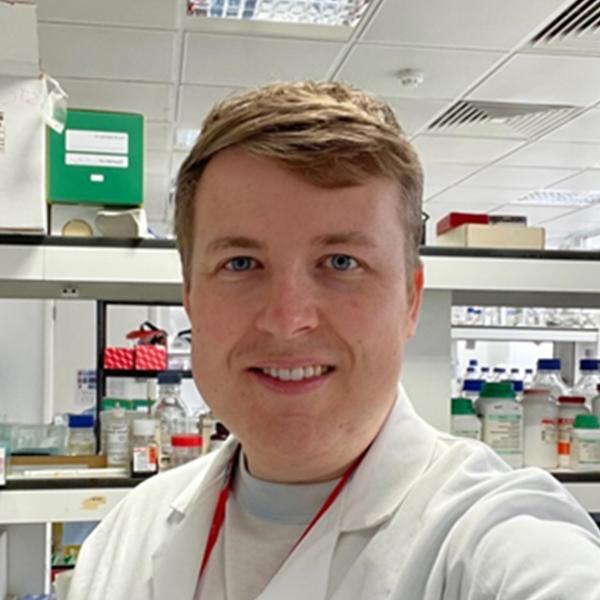Dr Callum Jones
MChem, PhD, AFHEA
School of Medicine and Population Health
Postdoctoral Research Associate


+44 114 215 9210
Full contact details
School of Medicine and Population Health
Room GU02, G Floor
The Medical School
Beech Hill Road
Sheffield
S10 2RX
- Profile
-
For enquiries, please contact – SMPH-West-Operational@sheffield.ac.uk
I completed my master’s degree in chemistry at the University of Sheffield between 2013-2017 with my dissertation based in organic and medicinal chemistry.
I completed my PhD at the University of Sheffield between the Department of Chemistry and the Department of Oncology and Metabolism. My thesis was centred on the development of transition metal complexes for their use in photodynamic therapy.
After this I joined the lab of Dr. Spencer Collis whereby my current research lies in using intermediate frequency, alternating electric fields (termed tumour treating fields) to disrupt and sensitise 3D-cultured, patient-derived glioblastoma cells towards chemoradiotherapy. This is in collaboration with Novocure.
- Qualifications
-
- 2013-2017, Master of Chemistry (MChem), the University of Sheffield
- 2017-2021, Doctor of Philosophy (PhD), The Development of Photodynamic Therapy using Transition Metal Complexes, the University of Sheffield
- Research interests
-
My research aims to develop and test new and innovative combination therapies to treat cancer which offers both higher potency and lower side effects than those currently available.
Currently, my work aims to enhance the treatment for glioblastoma multiforme (GBM) using alternating electric fields of intermediate frequency, termed tumour treating fields (TTF). Currently, GBM treatments still possess high relapse rates which are caused by repopulation from tumour edge cells which are often enriched with treatment resistant stem cell like subpopulations that possess a heightened DDR.
Primarily, TTF impose an anti-mitotic effect by disrupting microtubule alignment and their subsequent polymerisation which stalls mitotic progression and disrupts cytokinesis. Secondary lesser known TTF effects also cause DDR downregulation which permitting for potential sensitisation towards chemoradiotherapy and/or DDR inhibitors.
Additionally, I collaborate with the neurology team at the Royal Hallamshire Hospital to acquire, process and collect 3D grown, patient-derived glioma cells for testing and storage in the newly established GBM repository, the Sheffield BioBank. This bank aims to build and store glioma cell lines which model spatial locations, biomarker expression and stem-cell like phenotypes which are all explicit difficulties in globally treating GBM.
- Publications
-
Journal articles
- Heteronuclear d-d and d-f Ru(II)/M complexes [M = Gd(III), Yb(III), Nd(III), Zn(II) or Mn(II)] of ligands combining phenanthroline and aminocarboxylate binding sites: combined relaxivity, cell imaging and photophysical studies. Dalton Transactions, 48(18), 6132-6152. View this article in WRRO


- Photophysical and Cellular Imaging Studies of Brightly Luminescent Osmium(II) Pyridyltriazole Complexes. Inorganic Chemistry. View this article in WRRO


- Preparation of substituted tetrahydro-1-benzazepines by lithiation-trapping. European Journal of Organic Chemistry. View this article in WRRO


- SENP3-FIS1 axis promotes mitophagy and cell survival under hypoxia. Cell Death & Disease, 15(12).


- Ex-vivo models of post-surgical residual disease in human glioblastoma. F1000Research, 13, 1316-1316.


- Photostable Iridium(III) Cyclometallated Complex is an Efficient Photosensitizer for Killing Multiple Cancer Cell Lines and 3D Models under Low Doses of Visible Light. Journal of Medicinal Chemistry.


- Ex-vivo drug screening of surgically resected glioma stem cells to replace murine avatars and provide personalise cancer therapy for glioblastoma patients. F1000Research, 12, 954-954.


- Development and Optimisation of Tumour Treating Fields (TTFields) Delivery within 3D Primary Glioma Stem Cell-like Models of Spatial Heterogeneity. Cancers, 16(5), 863-863.


- Phototoxicity of cyclometallated Ir(III) complexes bearing a thio-bis-benzimidazole ligand, and its monodentate analogue, as potential PDT photosensitisers in cancer cell killing. JBIC Journal of Biological Inorganic Chemistry.


- DNA damage response inhibitors enhance tumour treating fields (TTFields) potency in glioma stem-like cells. British Journal of Cancer.


- Ex-vivo drug screening of surgically resected glioma stem cells to replace murine avatars and provide personalise cancer therapy for glioblastoma patients. F1000Research, 12, 954-954.


- Heteronuclear d-d and d-f Ru(II)/M complexes [M = Gd(III), Yb(III), Nd(III), Zn(II) or Mn(II)] of ligands combining phenanthroline and aminocarboxylate binding sites: combined relaxivity, cell imaging and photophysical studies. Dalton Transactions, 48(18), 6132-6152. View this article in WRRO
- Grants
-
- RoseTree Foundation PhD funding (2017-2020)
- Doctoral Academic Scholarship from the University of Sheffield (2017-2020)
- Recipient of The Ray Charles Undergraduate Scholarship (2013-2017)
- Teaching activities
-
- Lecturer (Cancer Biology and Therapeutics, MSc)
- Participates in teaching in lab-based projects both at pre and post graduate levels
- Mentor in the Thesis Mentoring Programme
- Associate Fellow of the Higher Education Academy
